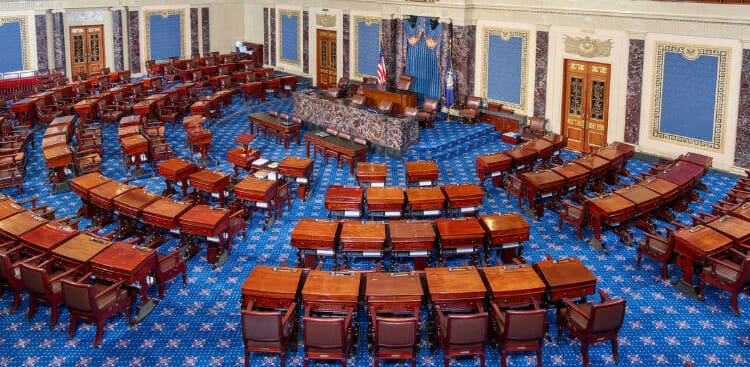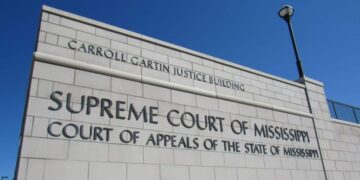July 29, 2025 Story by: Publisher
Senate Democrats have officially reintroduced the John R. Lewis Voting Rights Advancement Act (VRAA), a sweeping legislative effort to restore and bolster key protections originally guaranteed by the Voting Rights Act of 1965. This reintroduction comes just days before the VRA’s 60th anniversary.
The bill was first introduced in 2021 and passed the House but stalled in the Senate despite Democrats holding control of both chambers.
“Of all the problems facing our country, none is more important, and none is more urgent than our voting rights,” lead sponsor Sen. Raphael Warnock, D-Ga., said Tuesday at an event announcing the bill’s reintroduction. “Voting rights are preservative of all other rights.”
The legislation reestablishes the requirement that jurisdictions get federal approval before changing their voting laws, allows voters to register and vote on the same day, prevents voters from being purged from voter rolls if they miss elections and enables individuals whose votes have been suppressed to seek remedies in the courts.
The last time the Voting Rights Act was reauthorized was 2006, when Republican President George W. Bush was in office and the U.S. Senate passed the bill on a bipartisan basis.
“To my colleagues in the U.S. Senate, this is what America looks like. Every person gets a vote,” said Sen. Richard Blumenthal, D-Ct. “What are you scared of? What do you fear in giving people a vote?”
The Voting Rights Act of 1965 was signed into law by then President Lyndon Johnson. It was designed to enforce the 15th Amendment to the Constitution, which allowed African Americans the right to vote even if their reality was poll taxes, literacy tests and other obstacles that prevented them from doing so.
Since it became law, the Voting Rights Act has been reauthorized four times on a bipartisan basis.
New Preclearance Formula (Section 104)
- States are covered if they had either:
- 15+ voting rights violations in the past 25 years; or
- 10+ violations including at least one by the state itself.
- Individual political subdivisions are covered if they had 3+ violations.
- Covered jurisdictions automatically exit preclearance after a 10-year clean record.
- Bail‑out options expanded and streamlined.
Practice‑Based Preclearance (Section 105 / 4A)
- Jurisdictions with large minority populations must seek preclearance for certain common changes (e.g., district restructuring, absentee voting rules).
Strengthened Section 2 Standards (Section 102 & related parts)
- Codifies a clear “totality of the circumstances” standard from Thornburg v. Gingles for vote dilution cases.
- Applies a formal retrogression standard: if minority voting power is diminished, it’s a violation. Retroactive to January 1, 2021.
Expanded Court “Bail‑In” Authority (Section 103)
- Courts can require federal preclearance (“bail in”) for jurisdictions found to have violated voting rights—even if not covered by geographic formulas.
The bill’s reintroduction was timed to coincide with the 60th anniversary of the Voting Rights Act. It follows repeated attempts dating back to 2021, when the bill passed the House but failed to overcome Senate filibuster barriers. The 2013 Shelby County v. Holder Supreme Court decision invalidated the VRA’s coverage formula, severely weakening the law’s enforcement powers and prompting the need for new legislation.
“We applaud the reintroduction of the John R. Lewis Voting Rights Advancement Act,” NAACP Legal Defense Fund President and Director-Counsel Janai Nelson said in a statement.”
“A critical step in protecting Black communities that was named in remembrance of one of our nation’s chief voting rights champions. Since the 2013 Shelby County Supreme Court decision that severely weakened the Voting Rights Act, we have seen increasingly targeted attacks on Black voters’ access to the polls and to equal representation. Recent attempts by the executive branch to manipulate our electoral processes in order to entrench power require federal legislation like the VRAA that will protect voters. It is now more important than ever to shield our democracy from rampant voter discrimination.”
“As we approach the 60th anniversary of the Voting Rights Act, we should remember that it has enjoyed overwhelming bipartisan support since its original enactment, up to and including its most recent reauthorization in 2006. LDF urges Congress in the strongest terms possible to fulfill its responsibility to the Constitution and the electorate by passing the VRAA in order to fully restore and strengthen the Voting Rights Act.”
Representative Terri Sewell (D-AL) reintroduced the John R. Lewis Voting Rights Advancement Act in the U.S. House of Representatives in March. Known as H.R. 14, the bill aims to restore and strengthen legal protections against racial discrimination in voting and representation—safeguards that have been significantly weakened by Supreme Court rulings.

















